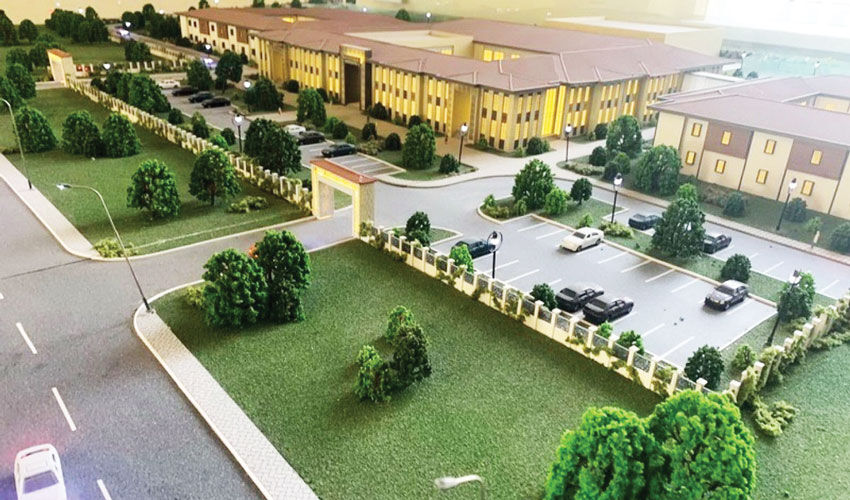
But this transition is constantly postponed. Although the construction of the college was started back in 2021 on the initiative of then Bashkan Irina Vlah and Turkish President Recep Tayyip Erdogan, and its launch was planned back in 2024. Despite the completed construction, the institution is still not operational.
Silviu Gincu, head of the Vocational Education and Training Policy Directorate of the Ministry of Education and Research of the Republic of Moldova, explained in response to a Logos Press inquiry: “At this stage, the building has been constructed, but it has not been put into operation yet. Representatives of ATU Gagauzia will have to accept the object. As long as the building is not put into operation, the process of opening the college cannot be continued”.
But the problem is not only in the technical acceptance. As local government representatives point out, the educational program has not yet been approved. “The building, the equipment – technically everything is ready. Methodologically not ready, the educational program itself has not yet been approved. In particular, it is necessary to decide in which languages the training will be conducted. This is also important. In fact, we were ready (to start accepting students – ed.), but because of the lack of a decision on the program this year, we did not have time again. It is a pity. We need to strengthen our work, because children are asking us too. This college is important and necessary, technical specialties will be trained here from the whole south and from other regions of Moldova, maybe even from Romania. Next year it can and should be opened!”, – shared with Logos Press Dmitri Manastirli, Chairman of the Standing Committee on Science, Education, Culture, Language and Cults of the People’s Assembly of Gagauzia.
The stumbling block was the issue of teaching languages. The possibility of conducting classes in Romanian, Gagauz, English and even, possibly, in Turkish is discussed. But not in Russian. At the same time, the Minister of Education and Research Dan Perciun earlier emphasized: “We will make every effort to organize the educational process in the college in the state language”.
According to observers, no decisions should be expected until the parliamentary elections are over and the new government is approved. Most officials prefer not to speak on this topic at the moment.
Against the background of the delayed opening of the college, a regional draft law on education is in the legislative procedure of the PAG, designed to contribute “not only to the preservation and development of the identity of the Gagauz people, but also to the integration of the education system of the autonomy into the general educational space of the Republic of Moldova”.
The General Directorate of Education of Gagauzia in its response pointed out the lack of a clear mechanism of coordination of new programs, structure of institutions and the list of disciplines between the autonomy and the Ministry. Although a unified education system is officially declared, in reality the coordination between the parties remains non-transparent.
Today in Gagauzia there are more than 50 institutions of early education and more than 40 of primary and secondary education. In all kindergartens the language of education is Russian, and almost all schools – with the exception of two – also use Russian as the main language of instruction.
In his conclusion to the bill, MP Alexander Tarnavsky emphasized that while preserving the right to education in Russian, it is also necessary to introduce a system of multilingual education. According to him, the law should establish clear norms and deadlines for its implementation: “It is important, while maintaining the advantage of the Gagauz education system in providing quality knowledge in one of the six official languages of the United Nations – Russian, to ensure the realization of one of the main objectives of the draft law: to promote the development of a multilingual education system, which provides for education in several languages. …The draft law should not only declare multilingual education, but also establish imperative norms regulating the timeframe for its implementation.
Meanwhile, the Moldovan Ministry of Education and Research has already launched the implementation of a national strategy for multilingual education in schools of national minorities (școli alolingve). The Action Plan for 2025-2030 provides for the introduction of Romanian as the language of teaching non-language subjects in such schools. The pilot phase of the program is planned for 2025-2027 and will be implemented in selected schools. Based on its results, the implementation mechanisms will be finalized and scaled up. By 2030, it is planned that 90% of schools with instruction in minority languages will switch to the use of Romanian for part of their subjects.
Journalist Elena Pahomova asked a very reasonable question: “How does this differ from Romanian-language schools, and what will happen to subject teachers from Russian schools?”.
The story of the opening of the Industrial College in Comrat was a reflection of a broader and deeper problem – the lack of a clearly coordinated educational policy between the center and the autonomy. Until the parties agree on transparent mechanisms of interaction and approve the program, the College will remain a symbol of unrealized opportunities and how difficult it is to agree even on a necessary and useful cause, especially since the College is, in fact, a gift to Moldova and the autonomy from Turkey.
As one of the former presidents accurately said, albeit in a different context: “You can take away by force, but you cannot give by force”.



